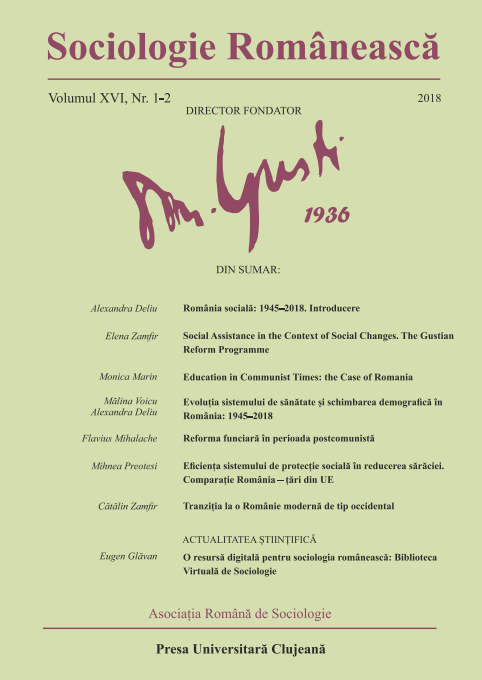Social assistance in the context of social changes. The Gustian Reform Programme
Social assistance in the context of social changes. The Gustian Reform Programme
Author(s): Elena ZamfirSubject(s): History and theory of sociology
Published by: Editura Eikon
Keywords: The Romanian social work system; integrated social work/services; reform; Gusti’s programme;
Summary/Abstract: The present study is a brief incursion into the history of social assistance in Romaniaand its role in social changes. In this context, the contribution of the Sociological School ofBucharest founded by D. Gusti is emphasised with respect to the emergence of the modernstatues of social assistance as distinct institutional field, and specialised profession. DimitrieGusti, a man of remarkable professional-scientific openness (studies of philosophy, sociology,ethics, social and political sciences, social statistics, etc.) was the promoter of a wide SocialReforms Programme based on the positions of scientific knowledge regarding society. It had ascore objective to guide the evolution process of Romania on a modern development path. Atthe core of an extended programme of reforms laid also the assumption of the socialresponsibility of sociology and socio-humane sciences. Sociology emerges according to theGustian vision as one of the fundamental social sciences involved in the processes of changingthe society. As “sociologia militans”, it is in the service of the nation and of the community.Next to sociology, social assistance’s transformative function plays an essential role inapproaching, solving, and preventing severe social phenomena. The changes demanded byRomania’s modernisation had also perverse effects at social, human, and moral level bymultiplying/emerging risks generating marginalisation, and social exclusion for a good part ofthe society. Thus, sociology and social assistance (centred on supporting vulnerablecommunities/individuals) gained a completely particular role in the reform model proposed bythe Sociological School of Bucharest. Here, social and socio-humane sciences were regardedas not only active tools for gaining knowledge about the society, but also as efficientintervention and change means. Due to their technicality and professionalism, social andhumane sciences in general, and sociology and social assistance in particular were regarded inthe process of social change as true “social and human engineering” (Zamfir, 1981). Thus, theSociological School of Bucharest created by D. Gusti and supported by cultural and politicadministrativeinstitutions mobilised also a wide collective of experts, and intellectuals of multiandinterdisciplinary openness, men with wide-ranging cultural perspective, as demanded bytransformative processes. The objectives of the Gustian reform project were structured clearlybased on a general theory of the social system. They were guided with priority on knowledgeabout the society starting with empirical research regarding local communities, as such.Focusing on field research regarding the reality of the communities in their entirety,underpinned the idea that villages developed historically, as distinct social entities.Consequently, their research and knowledge about them imposed the monographic-typeanalysis. In the vision of the Sociological School of Bucharest, the village and the communitiesbecome sure milestones of social development and activism. In this context, social assistanceplays a central role not only in recording the needs of the vulnerable ones, but also in solvingtheir specific issues by multiple approach. This participative instance of social intervention andsupport work at the community and individual level is sustained by “action-research”. Thus,taking into account its multiple levels of practical intervention in social reality, assistance gainsalso a special mission of prevention and diminishing modern risks.
Journal: Sociologie Românească
- Issue Year: 16/2018
- Issue No: 01+02
- Page Range: 13-22
- Page Count: 14
- Language: English

